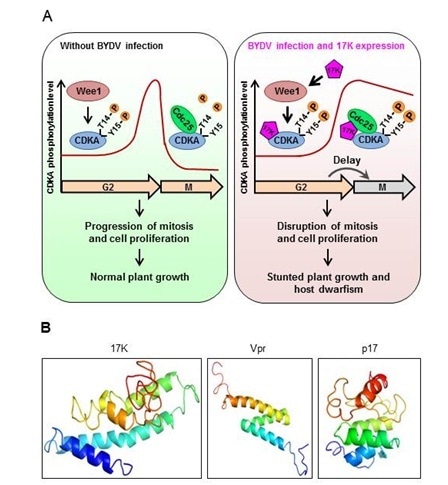Viruses are ever-present pathogens that lead to severe infectious diseases in humans as well as in agricultural crops.
Since a majority of viruses have simple genomes and encode just a small number of proteins, they must seize host cell resources for their propagation.

Disruption of barley cell division by BYDV 17K and secondary structure similarity among BYDV 17K and two animal viral proteins (HIV-1 Vpr and ARV p17). Image Credit: IGDB.
A better understanding of which viral proteins are involved and how the host processes are disturbed can considerably enable the design of therapeutic steps for regulating viral diseases in crop plants and humans.
Scientists from the Institute of Genetics and Developmental Biology (IGDB) of the Chinese Academy of Sciences have recently identified a plant viral protein called 17K that disrupts the host cell division to support its own propagation in infected tissues. The scientists also related it structurally to specific animal virus proteins.
The research, published online in the Science Advances journal on May 13th, 2020, is the outcome of 10 years of association between the IGDB group headed by Dr. WANG Daowen and the laboratory of Dr. ZHAO Yuqi at the School of Medicine of the University of Maryland.
The 17K protein is preserved in a group of cereal-infecting viruses known as barley yellow dwarf viruses (BYDVs).
Although BYDVs have been examined for over six decades, they often cause severe epidemics in barley, wheat, oat crops, and maize across the world, with dwarfing and yellowing being the typical outcomes.
The scientists hypothesized that one or more BYDV proteins may suppress the growth of host cells by disrupting cell division, an underlying process needed for animals and plants to develop, grow, and reproduce
When the researchers tested seven BYDV proteins separately in fission yeast, a model meant for cell division studies, they found that 17K was the only BYDV protein that can inhibit cell growth.
Using comprehensive molecular genetics and biochemical analyses, the scientists observed that the 17K protein can disturb cell division and thus lead to cell proliferation, on its own, and also in barley plants that are naturally infected by BYDV.
The researchers further demonstrated that 17K disrupted the function of Wee1-Cdc25-Cdc2/Cdk1, a molecular switch for the organized progression of cell division in both animals and plants.
Since the datasets of the study are all consistent with the theory that 17K, by its potential to perturb cell division, is the main factor in encouraging (or triggering) host dwarfism by BYDVs, the 17K protein could be a future target in controlling the BYDV proteins.
Most importantly, the scientists also observed that BYDV 17K looks like many animal viral proteins, for instance, the p17 protein of avian reovirus (ARV) and the Vpr protein of human immunodeficiency virus 1 (HIV-1) in the suppression of cell division and growth.
All three viral proteins represent a unique class of cell division regulators preserved between unrelated animal and plant viruses.
These proteins share similarities in secondary structure and also certain amino acid residues that are critical to disrupting cell division.
The proteins’ evolutionary process and their implication for relative studies of animal and plant viral pathogenesis are fascinating questions for more studies.
Source:
Journal reference:
Jin, H., et al. (2020) A distinct class of plant and animal viral proteins that disrupt mitosis by directly interrupting the mitotic entry switch Wee1-Cdc25-Cdk1. Science Advances. doi.org/10.1126/sciadv.aba3418.